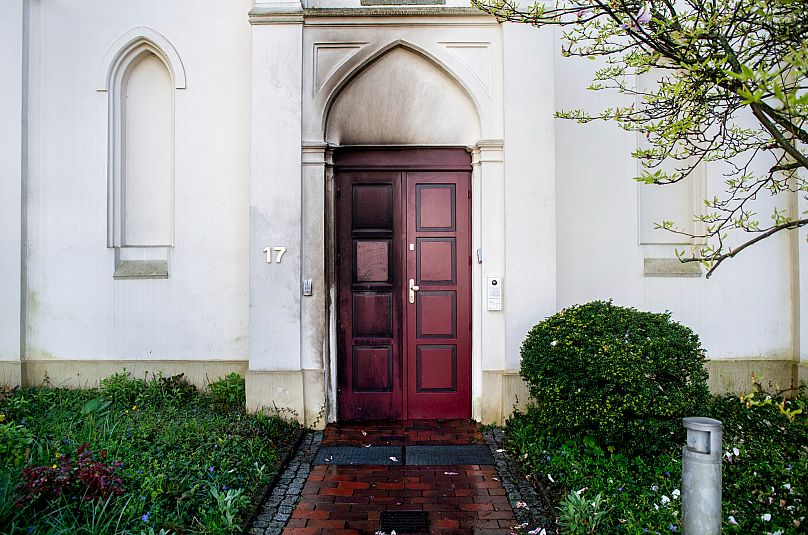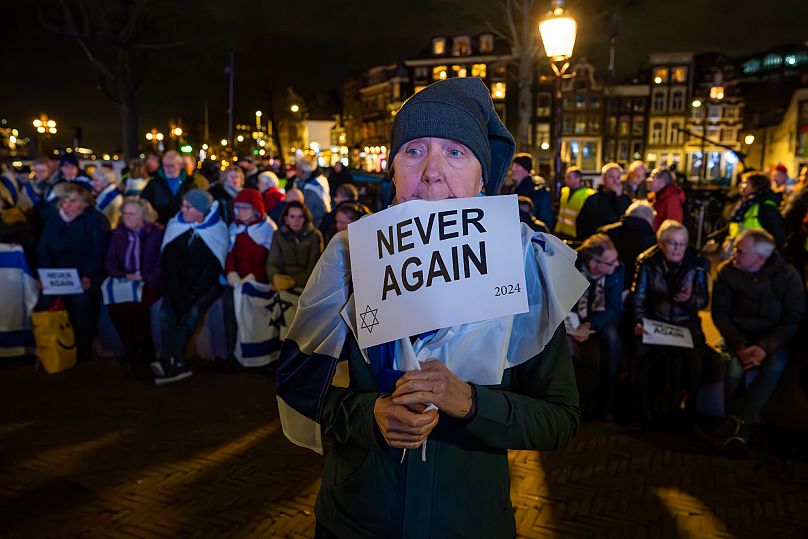The question before Europe today is stark: will we act decisively to confront antisemitism, or will we look back one day and recognise, too late, another missed warning, Dr Moshe Kantor writes in a Euronews exclusive.
Last week, towards the close of the long tourist season in Venice, a family of Orthodox Jews was physically assaulted as they were out on an evening stroll in the city, as the group of assailants brutally attacked and spat on them, shouting “Free Palestine”.
This type of attack has become a daily occurrence for the Jews of Europe.
From French Jewish children forced off an aircraft on their way back from a summer camp, synagogues set on fire and defaced with threatening graffiti and faeces across the continent, Jewish students abused on university campuses, this is the new norm for Jews in Europe.
In the last two years across the continent, antisemitism has surged with a ferocity unseen in generations.
This newest massive surge of Jew-hate began on 7 October 2023, the day the world witnessed barbarity on a scale few thought possible in the 21st century.
Hamas terrorists stormed into Israel, murdering over 1,200 people, abducting hundreds including toddlers and Holocaust survivors, raping and maiming untold others, and leaving behind devastation that shocked humanity.
It was the deadliest day for Jews since the Holocaust, and for a very brief moment the world seemed united in disgust and condemnation.
Yet in the two years since that terrible day, something profoundly disturbing has happened. Instead of solidarity, Jews across Europe have found themselves increasingly under attack. Instead of compassion, they have faced hostility and brutality.
In city after city, over the course of the last two years, incidents of antisemitism have doubled or even tripled. Many Jews feel they must hide their identities in public.
Families took children out of non-Jewish schools for the seeming safety of Jewish schools, while others think twice before sending their children to Jewish schools.
Many quietly discuss whether their future is still in Europe at all.
What is most alarming is not only the sheer number of incidents, but the way antisemitism has seeped into mainstream life.
It is no longer the preserve of the far-right or the margins of society. It now appears amongst the talking heads in the media, university lecture halls, in demonstrations on our streets, and in the rhetoric of politicians.
Left-wing antisemitism, once relegated to the far-left fringes, has become normative among liberal elites.
Masked as “legitimate criticism of Israel,” it often goes far beyond the policies of a government, holding Jews collectively responsible for a conflict thousands of kilometres away, in a way no other community or people is held responsible for the dozens of conflicts raging at this very moment.
In doing so, it revives the oldest and most dangerous tropes that have haunted Jewish history.
Shockingly, it receives legitimisation from the highest levels of state and government, with some political leaders comparing Israel to the Nazis and singling it out for unique treatment, censure and sanctions.
Other European countries have chosen more subtle ways of legitimising antisemitism. If they can’t perpetrate it, they will do their best to prevent Jewish leadership from engaging in the protection and security of Jewish communities.
'Never again' becomes 'Again and again'
This is not the first time I have issued such warnings. The writing was already on the wall when I addressed the World Holocaust Forum in 2020, before dozens of heads of states and governments in Jerusalem about the rising tide of antisemitism.
The Holocaust was Europe’s darkest hour, and its aftermath was marked by the vow of “Never Again.” Today, too many Jews fear that those words have lost their meaning, replaced by the grim reality of “Again and again.”
Jewish life is not an appendage to Europe; it is part of its very heart. From science and medicine to literature and philosophy, Jewish communities have contributed to and shaped this continent for centuries.
To allow antisemitism to push Jews out would not only be a moral failure, but also a cultural and societal loss for Europe itself.
This is why words of solidarity are no longer enough. We need action. Law enforcement must treat antisemitic crimes as seriously as any other form of violent extremism, ensuring that perpetrators face justice.
Governments must shoulder the responsibility of protecting Jewish schools and synagogues, ensuring that security is not left as a private or communal burden.
Online platforms must be held accountable for the way they amplify and profit from Jew-hatred. Education must teach not only the history of the Holocaust, but the patterns of scapegoating and conspiracy that fuel hatred today.
Political leaders, no matter their ideology, must be careful with their words and have the courage to call antisemitism what it is and to isolate those who spread it, even when it comes at political cost.
Antisemitism is never just a Jewish problem
History shows us, again and again, that antisemitism is never just a Jewish problem. It corrodes the societies that allow it to grow.
Where Jews are scapegoated, democracy weakens, and extremism thrives. The health of Jewish life in Europe is therefore a barometer of Europe’s own moral and civic health.
The choices we make now will determine whether our children inherit a Europe that truly lives up to its values, or one that repeats the darkest chapters of its past.
Two years on from the massacre of 7 October, it should be clear that antisemitism does not remain confined to rhetoric. It metastasises into violence, it destabilises communities, and it poisons the very fabric of democratic life.
Jews are resilient and they have endured centuries of persecution and rebuilt countless times. Nevertheless, resilience should not be mistaken for indifference. If Jews conclude that their future in Europe is unsafe, the loss will not only be theirs, it will be Europe’s.
We are at a pivotal moment. Antisemitism left unchecked never stops with the Jews. It spreads, it consumes, and it undermines the societies that tolerate it.
The question before Europe today is stark: will we act decisively to confront antisemitism, or will we look back one day and recognise, too late, another missed warning?
The choice is ours, and history will judge us by it.
Dr Moshe Kantor serves as President of the European Jewish Congress.













